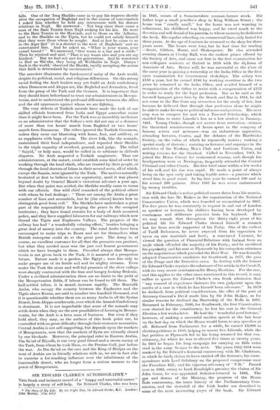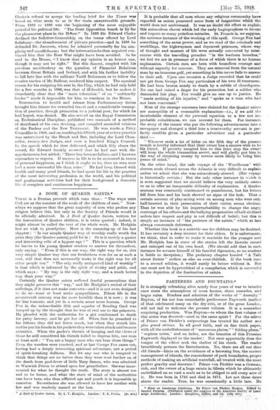SIR EDWARD CLARKE'S AUTOBIOGRAPHY.* Tins frank and intimate record of
a " happy and successful career " is largely a story of self-help. Sir Edward Clarke, who was born
• The Story of My Life. By the Right Hon. Sir Edward Clarke, S.C. London : John Murray. Ms. neti
in 1841, comes of a Somersetshire yeoman-farmer stock. His father kept' a small jeweller's shop in King William Street ; the house was "cruelly small," but the home was not wanting in refinement., his childhood was happy, and he owed much to the devotion and self-denial of his parents, to whose memory he dedicates the book. His regular schooling, on commercial lines, only lasted for
three years. At the age of fourteen he returned to the shop for.three years more. The hours were long, but he had time for reading —Scott, Gibbon, Hume, and Shakespeare. Ho also attended evening classes at Crosby Hall, won the earliest prizes offered by the Society of Arts, and came out first in the first examination for non-collegiate students at Oxford in 1858 with tho diploma of Associate of Arts. Better still, he was successful at the eose of the same year in gaining a writership at. the India Office in the first open examinatioh for Government clerkships. The salary was £150 a year, but he earned £180 by working overtime in the two years lie remained at the India Office, and availed himself of a reorganization of the Office to retire with a compensation of £253 in order to study for the legal profession. But as he said at the farewell banquet given him by the Bench and Bar in 1914, ho did not come to the Bar from any attraction for the study of law, but because he believed that through that profession alone he might be able to make his way to political influence and position. His next step was to compete for and win a Tanered Scholarship, which enabled him to enter Lincoln's Inn as a law student in January, 1861. Young Clarke, though not averse from recreation—witness his theatrical reminiscences of hours spent in the company of famous actors and actresses—was an industrious apprentice, attending lectures, Courts, and the debates of the Hardwicko Society, on the value of which he repeatedly insists ; making a special study of rhetoric ; assisting as lecturer and organizer in the activities of the Working Men's Club and Institute Union, and writing reviews for the Standard. Called in November, 18(34, he joined the Home Circuit for economical reasons, and, though his headquarters were at New ington, frequently attended the Central Criminal and other Courts. His first brief came within a few weeks of his call, and his rise was rapid. He made a point of always being on the spot early and taking legible notes—a practice which stood him in good stead. In his first year he earned 100 and in his second 200 guineas. After 1867 he was never embarrassed by money troubles.
Sir Edward Clarke's active political career dates from his associa. time with the late Mr. Raikes in the organization of the National Conservative Union, which was founded or reconstituted in 1867. For five years he was constantly in request in and out of London as speaker or lecturer, his abilities having been developed by continuous and deliberate practice from his boyhood. Here we may remark that throughout the thirty-eight years of his political life Sir Edward Clarke showed himself a staunch but far from servile supporter of his Party. One of the earliest of Tariff Reformers, he never swerved from his opposition to taxes on raw materials and food ; a convinced Unionist, lie viewed the question of Financial Relations with Ireand from an angle which offended the majority of his Party; and he sacrificed his popularity and his seat at Plymouth by his outspoken criticisms on the negotiations which preceded the Boer War. He was formally adopted Conservative candidate for Southwark in 1877, the year of the Penge and the Detective cases. In dealing with the former Sir Edward Clarke reprints the substance of his article in the Cornhill, with its very severe strictures onSir Henry Hawkins. For the rest, and this applies to the other cases mentioned in this record, it may suffice to quote Sir Edward Clarke's own frank admission that " any counsel of experience distrusts his own judgment upon the merits of a case in which he has himself been advocate." In 1879 he declined, from political considerations, the offer of the post of Attorney-General's Devil made him by Sir John Holker, as for similar reasons he declined the Mastership of the Rolls in 1897. Returned in February, 1880, for Southwark, the first Conservative over elected for the constituency, he lost his seat in the General Election a few weeks later. He had the " wonderful good fortune," however, of making a successful maiden speech at the last hour on the last day on which the House would listen to any speeches at- oll. Released from Parliament for a while, he earned £3,000 in election petitions in 1880, helping to unseat five Liberals, while the last petition at Plymouth led to his being returned for that con- stituency, for which he was re-elected five times in twenty years. In 1881 he began his long campaign for carrying on Bills twice read in the same Sersion to the next. The years 1882-1884 were marked by Sir Edward's financial controversy with Mr. Gladstone, in which he fairly claims to have carried off the honours; his corre- spondence with Lord Salisbury on the proposed compromise over the Franchise Bill ; and his vigorous advocacy of " P.R." Passed over in 1885, owing to Lord Randolph's pressing the claims of Sir John Gorst, he was appointed Solicitor-General in 1886. The ups and downs of the Ministry, the progress of the Home Rule controversy, the inner history of the Parliamentary Com- mission, and the downfall of the Irish leader are described in some of the most interesting pages of the book. Sir Edward Clarke's refusal to accept the leading brief for the Times was -.based- On whet seem to WI' ill' the litain unardaVerable grbtindis. From 1893 to'-1895 was the beginnit' ig of the meet enjoyable period Of his peliticallifel .."-The front Opposition trench '11 bYfar the pleasantest plate Ildlise.r' liv 1895 Sir Edward Clarke declined the S.olicitor-Generalship, on the terms offered by Lord Salisbirry—the'abandonment Of private practice—and in 1896 he .-defended janieson, whom. he admired personally for his 'sum- plicitYand unselfishness; but the information he then acquired con- vinced him that the Boer War inight.have been avoided. As he said in the Souse,knowthat my opinion is an honest one, thOugh it may not be right." But. this dissent, coupled with his previous Unorthodoxy on the question ' of ' Financial Relations betWeen Great Britain and 'Ireland, and with his further inability to fall Into line with the militant Tariff Refermers Or to follow the evasive tactics of Mr. Balfour, rendered him suspect. The nominal reason for his resigning his seat in the City, which he laid only held for a few months in 1900, was that of ill-health, but he makes it abundantly clear that the " Mere toleration " of an " unfriendly leader " made ft,. impossible for him to continue in the House.
Restoration to health and release from Parliamentary duties brought him leisure for extended travel and a considerable resump- tion Of practice, though promotion to a judicial post, for which he had hoped, was denied. He also .served on the Royal Commission on Ecclesiastical Discipline, published two manuals of a method of shorthand of his own devising, and compiled amended versions of the Psalms' and the New Testament. He was made. a Privy Councillor in 1908, and on reaching his fiftieth year of active practice was entertained by 'the Bench and Bar, including the Lord Chan- cellor, twenty-five Judges, and over a hundred King's Counsel. In the speech which he then delivered, and which fitly closes the record; Sir Edward frankly avowed that he had met with dis- appointments, but added; "There has been no failure, and I have no reproaches or regrets. If success in life is to be measured in terms of personal happiness, as I think it ought to be, then no man ever had a more successful life than mine." He had been blessed with health and many good friends, he had spent his life in the practice of the most interesting profession in the world, and his political and professional activities had for their background a domestic life of complete and continuous happiness.



























 Previous page
Previous page